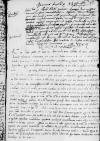Statueram his, quas mihi frater meus[2] a Dominatione Vestra Reverendissima attulit, per eundem, cum rursus a me ad ⌊Montem Regium⌋ mittetur, quod brevi futurum est, Dominationi Vestrae Reverendissimae respondere. Cum autem istius nuntii commoditas se mihi obtulit, nolui, ut sine meis hinc iret, iis itaque silentium dumtaxat meum excuso, paulo post tutius cum fratre[3] de omnibus scripturus. Nescio, quae non nostri moliantur, quemadmodum fortassis ex litteris spectabilis domini ⌊Ioannis a Werden⌋, qui nuper hic cum ⌊coniuge⌋ et domino ⌊castellano Gdanensi⌋ ex ⌊Prewsschenmarkt⌋[4] ad me diverterat vel intellexit aut paulo post intelliget. Sunt, qui nullum non movent lapidem, ut nobis incommodent et in odium tum nobilium, tum plebis inducant. Sed Dominus irridebit eos eorumque conatus frustrabitur, qui iustitiam et veritatem numquam deserit. Quae Dominatio Vestra Reverendissima de reverendissimo domino ⌊archiepiscopo⌋ meminit et aliis episcopis, non incommodum fuisset, quod mentem Dominationis Vestrae Reverendissimae scivissem, priusquam hinc ⌊cancellarium meum⌋ ad ipsum dominum ⌊archiepiscopum⌋ misissem. His etiam de rebus accuratius inter nos erit agendum et statuendum, hocque suo tempore etc.
Accepi XVIII huius iterum ab amico meo, domino ⌊Cornelio Sceppero⌋, ⌊⌋ ⌊Bruxellis⌋ VIa Decembris datas, in eodem fere, quo prius, negotio. Quarum sententiam Dominationi Vestrae Reverendissimae paulo post cum fratre[5] mittam, et alia omnia, quae in novis habuero, quaeque his negotiis et temporibus expedire videbuntur, praeterea quicquid ⌊cancellarius meus⌋ attulerit, cuius reditum in horas exspecto.
Officia in regno iam esse distributa Dominationem Vestram Reverendissimam, ut arbitror, non praeterit. De episcopatu Cracoviensi, cui collatus sit, et quibus cancellariatus officia sint distributa, adhuc mihi est incognitum. Brevi de omnibus certiores reddemur. Dominus Deus Dominationem Vestram Reverendissimam quam diutissime bene valentem et felicem conservet.

 BCz,244,p. 63
BCz,244,p. 63